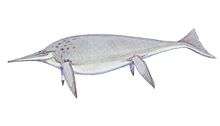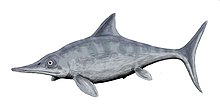Ichthyosaurus
Ichthyosaurus (derived from Greek ἰχθύς (ichthys) meaning 'fish' and σαῦρος (sauros) meaning 'lizard') is a genus of ichthyosaurs from the late Triassic and early Jurassic (Rhaetian - Pliensbachian[2]) of Europe (Belgium, England, Germany, Switzerland) and Asia (Indonesia). It is among the best known ichthyosaur genera, as it is the type genus of the order Ichthyosauria. [3][4][5]
| Ichthyosaurus | |
|---|---|
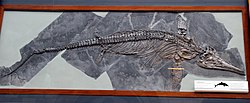 | |
| Fossil specimen of I. communis | |
| Scientific classification | |
| Kingdom: | Animalia |
| Phylum: | Chordata |
| Class: | Reptilia |
| Order: | †Ichthyosauria |
| Family: | †Ichthyosauridae |
| Genus: | †Ichthyosaurus De la Beche & Conybeare, 1821 |
| Type species | |
| †Ichthyosaurus communis De la Beche & Conybeare, 1822 | |
| Other species | |
History of discovery
Ichthyosaurus was the first complete fossil to be discovered in the early 19th century by Mary Anning in England.[6]
I. anningae, described in 2015 from a fossil found in the early 1980s in Dorset, England, was named after Anning.[7][8][9] The fossil was acquired by Doncaster Museum and Art Gallery, where it was misidentifed as a plaster cast. In 2008, Dean Lomax, from the University of Manchester, recognised it as genuine and worked with Judy Massare, of the State University of New York, to establish it as a new species.[7]
Description
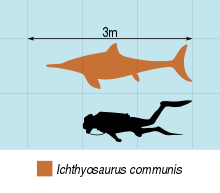
Ichthyosaurus was smaller than most of its relatives, with individuals measuring up to 3.3 metres (11 ft) in length.[10] Hundreds of well-preserved, fossilised skeletons have been found in Jurassic rock at Holzmaden, Germany. Some of the bones were still articulated. Some fossils still had baby specimens inside them, indicating that Ichthyosaurus was viviparous. Similar finds in the related Stenopterygius also show this.[11][12] The German fossils also featured the outline of Ichthyosaurus's skin, revealing that it had a fleshy dorsal fin on its back and a large caudal fin. Other ichthyosaur fossils showed this feature was not limited to Ichthyosaurus.
Classification
This cladogram below follows the topology from a 2010 analysis by Patrick S. Druckenmiller and Erin E. Maxwell.[13]
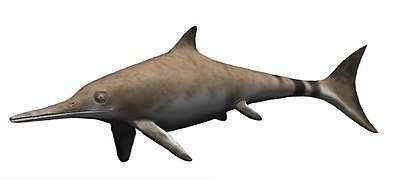
| Thunnosauria |
| ||||||||||||||||||||||||||||||||||||||||||||||||||||||||||||||||||||||||
Palaeobiology
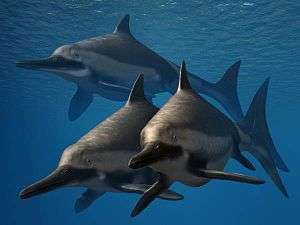
Ichthyosaurus ear bones were solid, probably transferring water vibrations to the inner ear. Even so, anatomical features demonstrate that it was a visually-oriented predator; it had huge, sensitive eyes, protected by bony shields. Coprolites of Ichthyosaurus reveal that its diet consisted of fish and squid.[15]
It was initially believed that Ichthyosaurus laid eggs on land, but fossil evidence shows that in fact the females gave birth to live young. As such, they were well-adapted to life as fully pelagic organisms (i.e. they never came onto land). The babies were born tail first to prevent them from drowning in the water.[11]
Cultural significance
| German Wikisource has original text related to this article: |
Joseph Victor von Scheffels poem Der Ichthyosaurus describes its extinction in humouristic verses. A monument on Hohentwiel cites it as well.[16] The poem has been translated among others by Charles Godfrey Leland [17] Some of the stanzas:
'The rushes are strangely rustling,
The ocean uncannily gleams,
As with tears in his eyes down gushing,
An Ichthyosaurus swims.
'He bewails the frightful corruption
Of his age, for an awful tone
Has lately been noticed by many
In the Lias formation shown.
...
'The Plesiosaurus, the elder,
Goes roaring about on a spree;
The Pterodactylus even
Comes flying as drunk as can be.
'The Iguanodon, the blackguard,
Deserves to be publicly hissed,
Since he lately in open daylight
The Ichthyosaura kissed.
'The end of the world is coming,
Things can't go on long in this way;
The Lias formation can't stand it,
Is all that I've got to say!'
...
And this petrifideal ditty?
Who was it this song did write?
'Twas found as a fossil album leaf
Upon a coprolite.
See also
- List of ichthyosaurs
- Timeline of ichthyosaur research
References
- Dean R. Lomax; Judy A. Massare (2016). "Two new species of Ichthyosaurus from the lowermost Jurassic (Hettangian) of Somerset, England". Papers in Palaeontology. Online edition. doi:10.1002/spp2.1065.
- Dean R. Lomax (2010). "An Ichthyosaurus (Reptilia, Ichthyosauria) with gastric contents from Charmouth, England: First report of the genus from the Pliensbachian". Paludicola. 8 (1): 22–36.
- Maisch MW, Matzke AT. 2000. The Ichthyosauria. Stuttgarter Beiträge zur Naturkunde Serie B (Geologie und Paläontologie) 298: 1-159
- McGowan C, Motani R. 2003. Ichthyopterygia. – In: Sues, H.-D. (ed.): Handbook of Paleoherpetology, Part 8, Verlag Dr. Friedrich Pfeil, 175 pp., 101 figs., 19 plts; München
- Maisch MW, Reisdorf AG, Schlatter R, Wetzel A. 2008. A large skull of Ichthyosaurus (Reptilia: Ichthyosauria) from the Lower Sinemurian (Lower Jurassic) of Frick (NW Switzerland). Swiss Journal of Geosciences 101: 617-627.
- Essesials of Anthropology 6th addition
- Gill, Victoria (19 February 2015). "BBC News - Forgotten fossil found to be new species of ichthyosaur". BBC Online. Retrieved 22 February 2015.
- "New species discovered in Doncaster". 19 February 2015. Archived from the original on 22 February 2015. Retrieved 22 February 2015.
- Lomax, Dean R.; Massare, Judy A. (2015). "A new species of Ichthyosaurusfrom the Lower Jurassic of West Dorset, England, U.K." Journal of Vertebrate Paleontology: e903260. doi:10.1080/02724634.2014.903260. ISSN 0272-4634.
- Lomax, D.R.; Sachs, S. (2017). "On the largest Ichthyosaurus: A new specimen of Ichthyosaurus somersetensis containing an embryo". Acta Palaeontologica Polonica. doi:10.4202/app.00376.2017.
- Böttcher R. 1990. Neue Erkenntnisse über die Fortpflanzungsbiologie der Ichthyosaurier. Stuttgarter Beiträge zur Naturkunde Serie B (Geologie und Paläontologie) 164: 1-51
- Martill D.M. 1993. Soupy Substrates: A Medium for the Exceptional Preservation of Ichthyosaurs of the Posidonia Shale (Lower Jurassic) of Germany. Kaupia - Darmstädter Beiträge zur Naturgeschichte 2: 77-97
- Michael W. Maisch and Andreas T. Matzke (2003). "Observations on Triassic ichthyosaurs. Part XII. A new Lower Triassic ichthyosaur genus from Spitzbergen". Neues Jahrbuch für Geologie und Paläontologie, Abhandlungen. 229: 317–338.CS1 maint: uses authors parameter (link)
- Arkhangel’sky, M. S., 1998, On the Ichthyosaurian Genus Platypterygius: Palaeontological Journal, v. 32, n. 6, p. 611-615.
- Palmer, D., ed. (1999). The Marshall Illustrated Encyclopedia of Dinosaurs and Prehistoric Animals. London: Marshall Editions. p. 80. ISBN 1-84028-152-9.
- Werkkatalog Sieckes (PDF; 7,7 MB)
- Charles Godfrey Leland, Gaudeamus! Humorous Poems by Joseph Viktor von Scheffel, Ebook-Nr. 35848 on gutenberg.org
